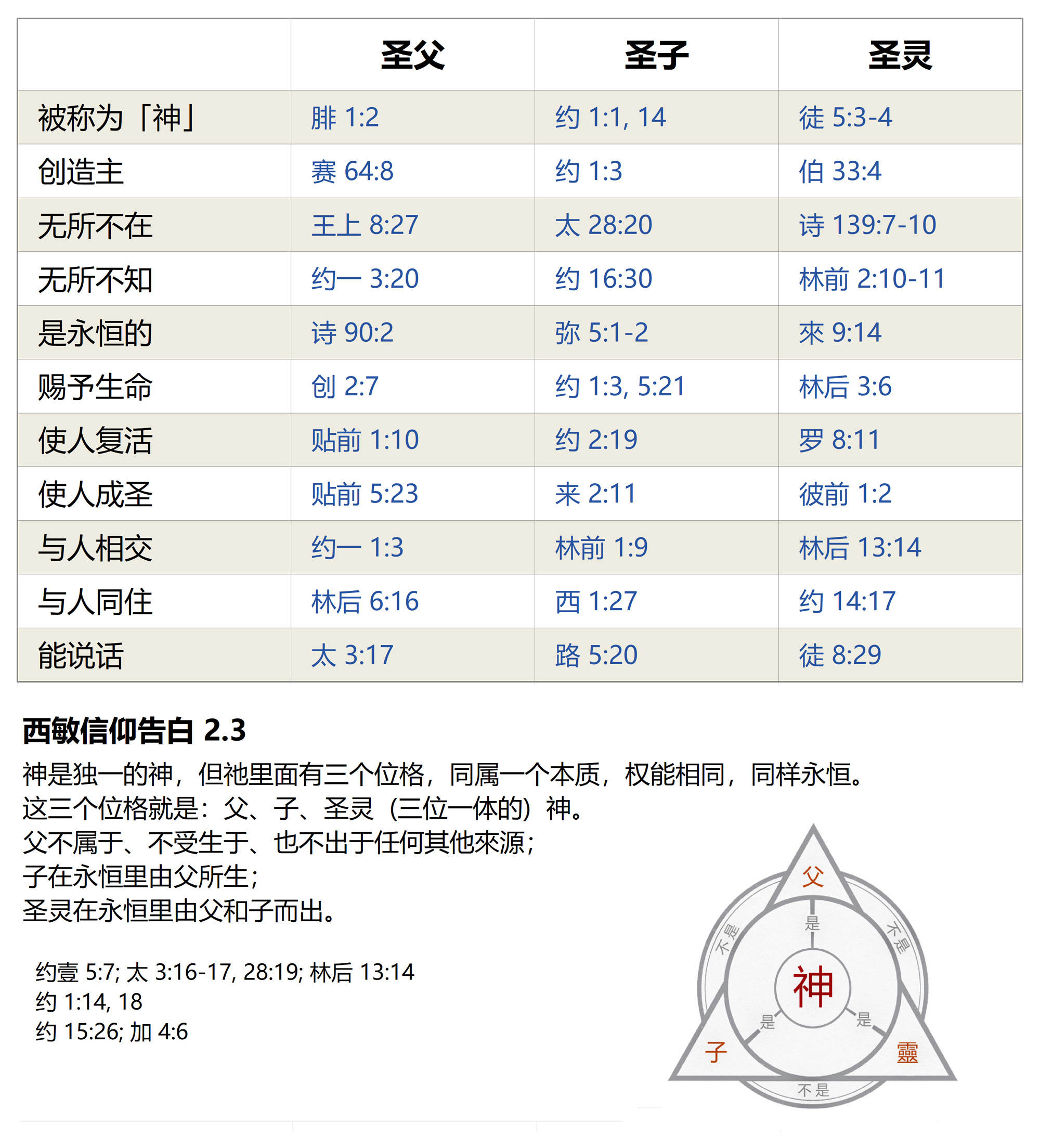“三位一体” (The Trinity) 的教义常被误解成 “三个神” 或 “一个神扮三角”。其实,这两个都是错的。基督徒相信:上帝是一位,却在三个位格中永远存在——父、子、圣灵。“位格” (person) 这个词帮助我们表达:上帝不是孤单的一体,而是一位有内在关系、能相爱、能相交的上帝。三一论不是哲学推演,而是圣经的启示;我们按着启示承认:在上帝里面既有独一性,也有位格的区别。
本质 (substance) = “是什么” (三位共享的神性)
位格 (person) = “谁” (彼此可说 “我-你-他”)
上帝在本质上是一,却在位格上是三。
1. 位格的构成要素
位格不是由理性、情感、意志所构成,这些是属于本质而非位格。构成 “位格” 的三个要素:
- 个体性的自存 (subsistentia individua)
位格是神性之 “自存者”,并非神性的一部分或三分之一。每个位格都是完整的神。
- 自我意识与关系性 (self-conscious relation)
每个位格皆具自我意识。每个位格都能说 “我”,能与另两位说 “你”。在彼此相交与相爱中显其个人性;此为上帝内在生命的关系结构。
- 不可交流的位格特征 (proprietates personales)
在救赎历史中,此次序显为 “父定旨、子成就、圣灵施行”。这不是三种分工或三位神,而是一位上帝在三个位格中的工作。
位格之间以关系区分,以本质联合。这种区别不是时间的次序,而是永恒的关系,但没有本体的高下。三位共享一意志、一荣耀、一本质。
2. 上帝只有一个意志
意志属于本质,不属于位格。既然上帝只有一个本质,就只有一个意志。父、子、圣灵不会有不同想法或相互冲突的决定。
自从道成肉身之后,耶稣基督具有一个位格、神人二性、以及两个意志 (神性意志、人性意志)。当耶稣在客西马尼说 “不要照我的意思,只要照你的意思”(太 26:39)时,指的是祂作为人的意志顺服神的旨意,而非神子与父的神圣意志相冲突。
- 在神性上:三位同一意志;
- 在救赎职分上:子以人的意志顺服那一神圣旨意。
若说三一有三意志,就破坏一神的统一;若否认基督有人性意志,就否定祂的真实人性并摧毁救赎的完整性。
3. 圣经如何启示三个位格
- 耶稣受洗:父说话、子受洗、圣灵降临 (太 3:16–17)。
- 主的大使命:奉 “父、子、圣灵” 的名 (单数) 施洗 (太 28:19)。
- 使徒的祝福:“主耶稣基督的恩惠、神的慈爱、圣灵的感动” (林后 13:14)。
4. 常见错误的澄清
- 形态论 (Modalism)
错误地认为上帝只是一个位格,扮演三种角色。上帝不是 “戴三种面具”,而是在三种真实位格中永远存在。
- 三神论 (Tritheism)
错误地认为三位格各自有独立意志、能力与存在,成为三个神。位格的区别在关系,不在本质或意志。
- 心理学人格论的误区
错误地把位格当成 “理性、意志、情感” 的结合体,是以人的心灵结构套上帝之本体。
西敏信条 2. 论神和三位一体
一、只有一位独一永活的真神,祂的本体和完美是无限的,是至纯之灵,眼不能见;没有形体、四肢、情慾,永不改变,广大无边,永远长存,不可测度,全能,至高智慧,至为圣洁,最自由,最绝对;按照自己不变且最公义的旨意,为了祂自己的荣耀行做万事;最有慈爱、有恩惠、有怜悯、长久忍耐、有丰盛的良善与真理;赦免罪孽、过犯与罪恶;赏赐那殷勤寻求祂的人;祂的审判最公义、最可畏,祂恨恶诸恶,断不以有罪的为无罪。
二、一切生命,荣耀,善良,祝福都在神自己里面,也都属于祂;并且唯独在祂自己里面 (且归于祂自己) 拥有完全的充足,祂不需要祂所造的任何被造之物,也不从他们得到任何荣耀,反倒在他们里面、借着他们、向着他们、并在他们身上,彰显祂自己的荣耀,祂是万有的独一根源,万有都是本于祂、倚靠祂、也归于祂,并且在万有之上有至高主权,可以借他们、为他们、对他们,行祂自己所喜悦的事。万有在祂面前都是赤露敞开的,清晰显明的;祂的知识无限,毫无错误,并不依靠受造之物,所以对祂来说,没有任何事物是偶然或不确定的。祂的一切旨意、作为和命令都是至圣的。天使、世人、以及别的受造之物,都应当按着祂的美意所要求他们的,敬拜、事奉、且顺从祂。
三、神是独一的神,但祂里面有三个位格,同属一个本质,权能相同,同样永恒,这三个位格就是:“父、子、圣灵” (三位一体的神)。父不属于、不受生于、也不出于任何其他来源;子在永恒里由父所生;圣灵在永恒里由父和子而出。
(经文省略)
 Default
Default  No Comments
No Comments  Default
Default  No Comments
No Comments 